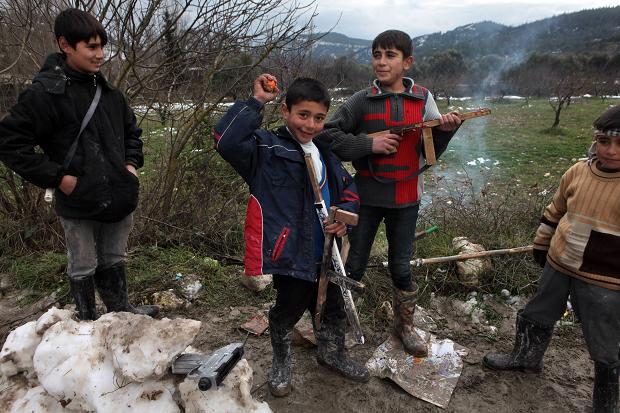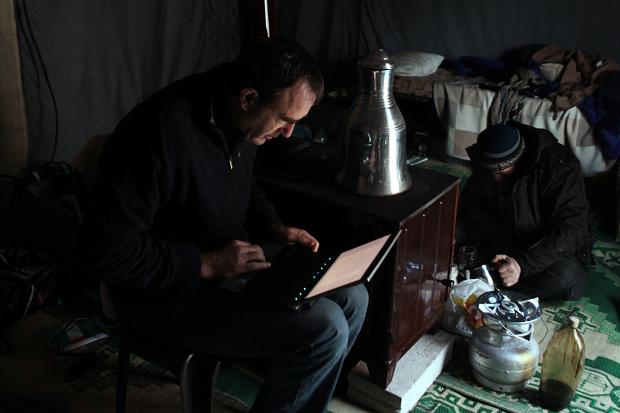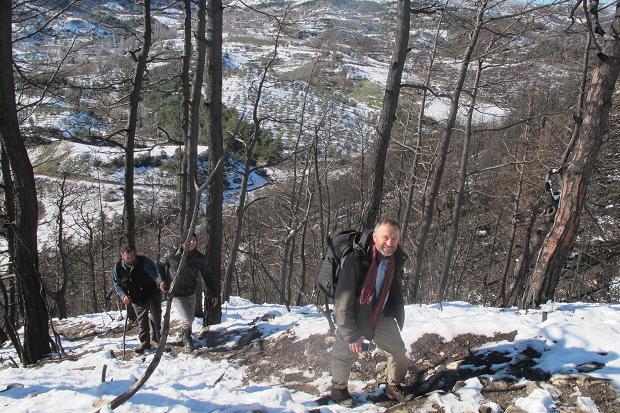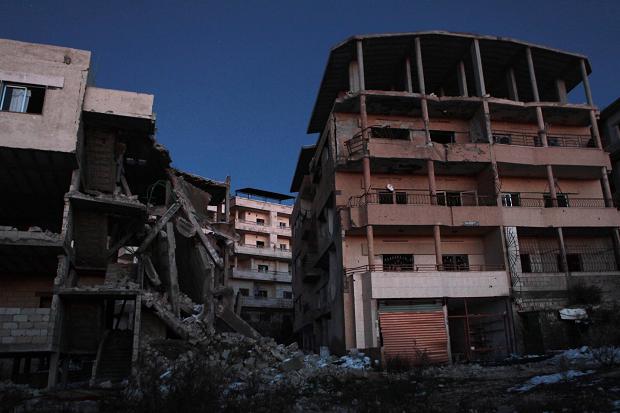January 2013
Trekking through a charred forest, a message appeared on my mobile — “Ministry of Tourism welcomes you in Syria”
There are several ways of crossing into rebel-held northern Syria. At one border post the Turks let you enter freely. At another they turn a blind eye as you literally skirt its outer wall, dodging bedraggled Syrian refugees coming the other way. Sometimes you have to trudge through olive groves, lugging your backpack and flak jacket, lumps of mud clinging to your boots, until you reach an opening cut in the coils of razor wire beyond sight of the nearest watchtower. If you’re lucky, you get driven across by smugglers who have cut gaps wide enough for vehicles, though the last time we did that we found a Turkish tank parked across the opening when we tried to return.
The Times photographer Tom Pilston and I were supposed to drive across when we “went in” earlier this month. Unfortunately, heavy snow during the night made the mountainous track impassable, so we had to walk.
We were escorted by our “fixer”, Abdullah, a Syrian Army defector who escaped to Turkey last year using his cousin’s ID card to get through regime checkpoints, knowing that he would be killed if the deception was spotted. We waded across a swollen, icy river and clambered up a steep mountainside, the exhilaration of the adventure easing our apprehension.
By the time we reached the top it was obvious we were in Syria: we found ourselves trekking through a charred forest set ablaze by shells last summer — an eerie black-and-white landscape in the snow. And a message appeared on my mobile — “Ministry of Tourism welcomes you in Syria”. I smiled wryly, for I had enjoyed a family holiday here three years ago and never anticipated returning in this manner. You do not enter northern Syria without a trusted contact on the other side, someone able to provide transport, food, accommodation and protection in a ravaged land where those commodities are rare. It could be a Free Syrian Army officer or a member of a supply chain.
This time it was an English-speaking doctor who had returned home from Britain to support the revolution and who runs a field hospital in a town called Salma. We slithered down the far side of the mountain, crossed another river on a felled tree, and found him waiting on the far side, anxious because our trek had taken two hours. He greeted us with bear hugs. The rebels welcome journalists because they want their story told, and twice over the next 24 hours I was unexpectedly presented with bunches of narcissi.
The doctor had brought four armed guards because, even in liberated Syria, Western journalists are occasionally kidnapped. We piled into a battered minibus, its shot-out windows replaced with plastic sheeting — on another trip last year we joined some fighters who were going to fight in Aleppo in an old icecream van.
We drove south through beautiful mountain valleys carpeted with olive groves and orange orchards. The oranges had not been picked because there is little diesel for tractors and few people left in the villages, most having fled to Turkey during last year’s battles.
We passed the occasional burnt-out tank. We crossed the motorway from Latakia to Aleppo, a crucial artery from Syria’s biggest port to its biggest city that the rebels severed months ago. It is deserted, strewn with rocks and the charred carcass of a military bus. We bought thick black coffee at a roadside stall, and then spilt it as our driver accelerated along the last stretch of road before Salma, careering around the corners. “Allahu Akbar,” our escorts cried. That stretch was fully exposed to the fire of regime forces stationed across the valley, they explained.
Before the war, Salma was a summer resort built around a mountain top, its elegant apartments enjoying magnificent views across the receding foothills to the distant Mediterranean. Today it resembles a scene from The Lord of the Rings or a science-fiction movie. The valley below is the front line. On the dark and forbidding mountain opposite stands The Tower — a military base from which tanks and artillery regularly shell Salma. The apartment blocks facing The Tower have been largely destroyed. Except for a few hundred fighters, Salma’s population has fled, leaving a ghost town where curtains flap in shattered windows and feral cats stalk empty streets.
The hospital is in the basement of a block the upper storeys of which were destroyed by a bomb. There were no fighters being treated when we arrived, just two civilians. The first — a man with an infant son suffering from hepatitis A — was a native of Salma who had refused to leave. “I prefer to die in this place than to flee,” he declared.
The second was a 37-year-old refugee with bronchitis who had fled from a beleaguered Sunni town on the coast and was occupying an abandoned apartment with her seven children. She said she was staying in Salma because she had heard Turkey’s refugee camps were even worse. She was given bread by the fighters, collected wood from the forests for fuel and had found clothes in the apartment, but lacked blankets and the children had diarrhoea. In liberated Syria everyone has a story to tell.
The doctor had not visited his own apartment for three months. He agreed to take us there, and found it wrecked. “I’m heartbroken,” he admitted as the sun set in a red blaze over the distant sea. “This place is full of memories of family and friends who used to visit in the summer. Salma used to be crowded with people, everyone happy and enjoying themselves.”
Parts of northern Syria are still extremely dangerous, with fierce fighting. In Aleppo, snipers in the imposing citadel pick off rebels and civilians, while artillery and warplanes bombard rebel-held districts. Three weeks after we visited Aleppo’s last functioning hospital, in November last year, it was destroyed by shells. One night I fell asleep counting explosions as you might count sheep, and reached 50 with only a few seconds between each. The destruction is appalling.
The Great Souk, in whose labyrinthine shop-lined alleys my family spent many happy hours exploring in 2009, is now a burnt-out no-man’s land whose passages recede into terrifying darkness.
In Salma there is a military stand-off, and the risk is less, but you still sprint across exposed gaps between buildings for fear of snipers, and there is always a chance of being hit by a random shell. However, the greater danger that evening seemed to be hypothermia as the temperature plunged faster than the sun. It was so cold the ink in my pen froze. My feet went numb in shoes still sodden from our trek.
We hurried back to the basement hospital. Fortunately it had a stove for warmth and a generator for light, though the latter kept cutting out so I interviewed the doctor by torchlight. Later we devoured a bowl of pasta with tomato sauce from the hospital’s meagre rations, and bedded down on mats on the floor.
That was a good night, though we’ve had better. In Aleppo we’ve been put up in the commandeered apartment of a regime pilot, sleeping in his children’s bunk beds with their toys scattered around, and we’ve been treated to feasts of kebabs, barbecued meat, yoghurt and salad while most of the population goes hungry. In a town called Tal Rifaat, equally embarrassingly, our FSA hosts moved all the women out of a farmhouse so we could stay there.
We have also had many worse nights. We have shared a house in the town of Atmeh on the Turkish border with 35 refugees where the owner had to clear a passageway of women whenever we wanted to use the toilet. We have endured interminable evenings trapped in rooms with chain-smoking men, or pumped-up young fighters flaunting their AK-47s, or Syrians haranguing us over the West’s failure to support their revolution. We have been subjected to a concerted attempt by the hardline Islamic fighters of Jabhat al-Nusra to convert us — in Afghanistan such people would be enemies, but here they are allies.
Often there is no electricity, water or sanitation — you quickly learn to bring your own loo paper, hygienic hand gel, energy bars and torch.
Usually you sleep fully-clothed beneath a blanket on the floor beside everyone else — or try to. Shells may be exploding in the distance. If there is electricity, the television will invariably remain on — one night, surreally, it featured a Mr Bean film. Syrians make or take calls on their mobiles at all hours, and are champion snorers.
You are likely to be woken before dawn by a call to prayer from a nearby mosque, or by room-mates performing their prayers right next to you. Sleep deprivation quickly becomes a problem.
In Salma the next morning, after a bowl of hot lentil soup, the doctor took us to nearby villages. One that had been inhabited entirely by President Assad’s fellow Alawites was now deserted, its inhabitants having locked their homes and fled to government-held territory.
Another military base, strategically placed on a mountain top, had visited varying levels of destruction on the Sunni villages until the rebels captured it last year. The roads were cratered and empty. A main railway line lay silent and rusting. No schools or shops were open. The fields were neglected. The countryside appeared largely depopulated, apart from the occasional cluster of flimsy refugees’ tents pitched on frozen mud.
We saw few women, and it came as a shock to find a group of children in the last village we visited. They were even playing, after a fashion. They waved pretend AK-47s, hewn from wood, and had erected a mock checkpoint. They said they were looking for spies but let us through, and soon we were heading back to the safety of Turkey — this time in a tractor and trailer that carried us up the mountain, back through the wire and away from that apocalyptic landscape.
This is a slow-motion war, a grinding war of attrition. For ordinary Syrians there is no foreseeable end to the hardships and traumas.
All normal life has been suspended, but no one we met complained.
None said they regretted the uprising. Everywhere we found a comradeship born of shared adversity and common purpose; a decency in the way people treated each other that did not exist in Assad’s Syria, an absolute conviction that the revolution will — must — ultimately prevail. Defeat, after all, would mean almost certain death.
“We’re thinking of the future,” the doctor said as he bade us goodbye. “In this life people die so that others can live. You can’t have a good country without sacrifices.”




